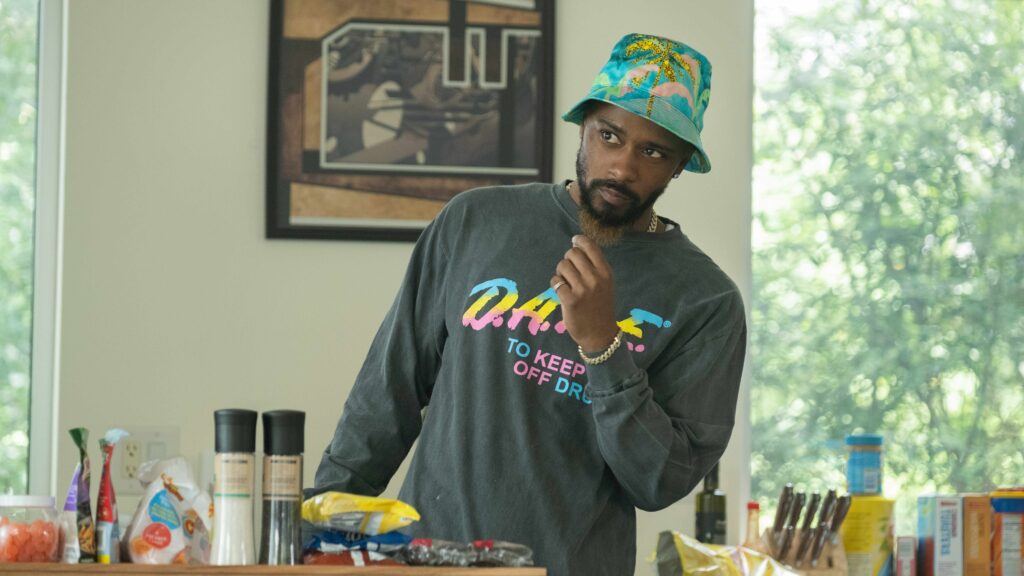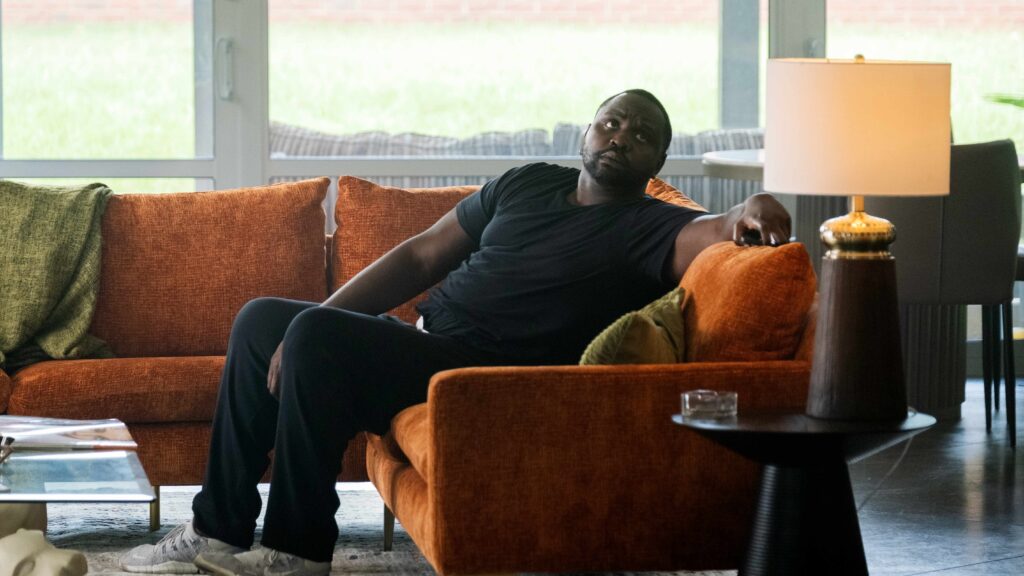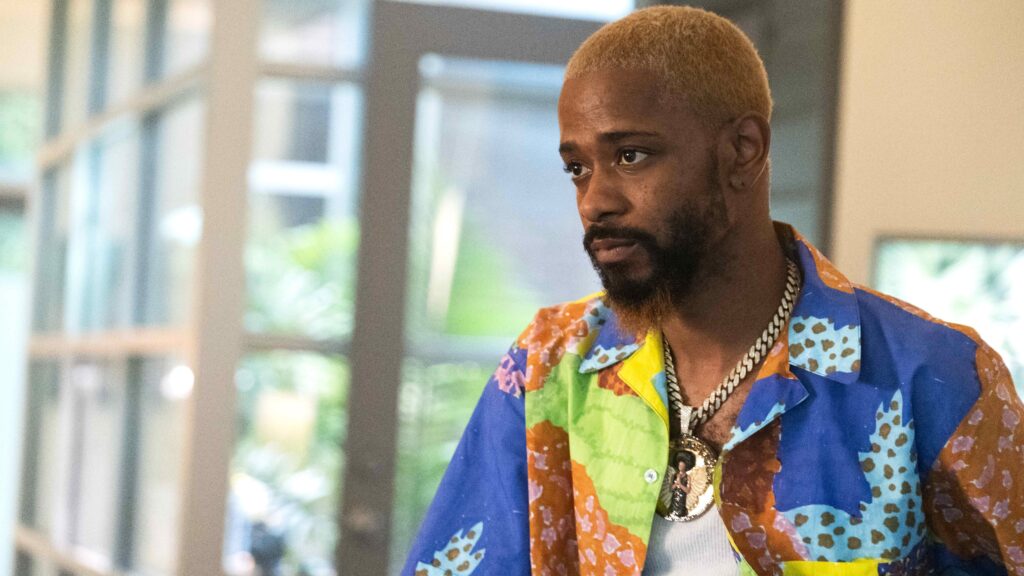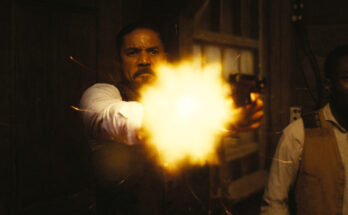Want to hear more from the actors and creators of your favorite shows and films? Subscribe to The Cinema Spot on YouTube for all of our upcoming interviews!
Managing editor & film and television critic with a Bachelor's of Arts in English Literature with a Writing Minor from the University of Guam. Currently in graduate school completing a Master's in English Literature.
This week’s episode of Donald Glover’s hit FX surreal comedy-drama television series, Atlanta, is one of the more suspenseful ones of the season. It isn’t the first time we have had to deal with a whodunit mystery. Remember the Ass Crack Bandit of NBC’s Community Season 5 Episode 3, “Basic Intergluteal Numismatics”? Well, how can you not?
The sixth episode of the series’ final season is titled, “Crank Dat Killer”. It is written by executive producer Stephen Glover and directed by executive producer Hiro Murai.
In this review, I will be discussing Atlanta Season 4 Episode 6. There will be no major spoilers here, as the title of this article suggests. Nonetheless, please read ahead at your own discretion.
Please note that I have seen this week’s episode a few times before its airing to properly understand the small details and the larger picture of the narrative.

Plot Synopsis
According to FX Networks, here is the logline for Atlanta Season 4 Episode 6—“Crank Dat Killer”.
Ay, Ya’ll remember how we used to hit the club and do the Pool Palace and Crank Dat and nobody got shot? Yeah me neither.
FX Networks Press Room
Discussion
Grab your nearest box of tissue, maybe Kleenex if you have it. Hiro Murai and Steven Glover remain one of the most prolific director/writer duos of Atlanta to date, “Crank Dat Killer” included. I personally believed that late-September’s “Light Skinned-ed” episode was my favorite of the final season, but this week’s episode tops that. It follows in the same vein as the season premiere in the way that we have a beloved character — this time Alfred “Paper Boi/ Al” Miles (Brian Tyree Henry) — having to look over their back. However, unlike the knife-wielding elderly white woman in the wheelchair, there is a life-threatening figure to actually be worried about.
While Season 3 had “short film”-like episodes that also ventured outside of the protagonists’ stories, it’s been nice to see remnants of that narrative style in Season 4’s “The Homeliest Little Horse” and now “Crank Dat Killer”. Allow me to put my English Literature degree to use here.
Call into mind Donald Glover’s “This is America” music video. What is perfect about it is the message it sends. On the one hand, we see an alluring depiction of an object of desire in the foreground. It is a spicy image, it doesn’t make you think so much, therefore, there is nothing wrong with it. That is what we get in the subplot involving Earnest “Earn” Marks (Glover) and Darius Epps (LaKeith Stanfield). Meanwhile, there is the background or backstage. This is where the larger conflict takes place. Chaos runs rampant, and no exact truth behind violent actions exists. It just happens.
“Crank Dat Killer” makes a great deal of oscillating between the two spotlights of both the foreground and the background, including what/who is backstage. In this case, it is a young man named Roberto (guest star Adrian Mauro).
Aesthetics
What I find enticing about Atlanta time and time again is its use of production and costume designs. Alfred, whom we have seen in Season 3 to have evolved as a figure in the music industry, now lives in a new home and not where we have seen him reside in the first two seasons. O’Brien and his team crafted an appealing architecture, yet we are only given the first floor of the crib. The character has a neat garden just outside the living room where he grows his plants, and yet, it seems that other things he has may not be enough, such as the television set.
Ayala’s set decoration contributes profoundly to the looks of the episode. Outside of the mall location, vehicles are where they need to be placed, and inside, we have kiosks. There is one item in Alfred’s home that you would think foreshadows his fate in the episode. It pays great homage to Christopher “Biggie Smalls” Wallace, but what meaning it holds is up to your interpretation. O’Brien and Ayala should have won an award for their work last season, so I do hope that we can pay them even more attention for Season 4.
In terms of Hasbourne’s costuming, Stanfield wears the most fashionable outfits out of the episode’s three main actors. One thing that you should know, if you don’t already, about Darius is he is possibly the best dressed in a room with Alfred and Earn.
Atlanta and the Spreading of Information in the Media
In a continuation of last season’s “Cancer Attack” episode, Darius continues to give Alfred advice on his use of digital technology. This is nothing new nor is it a spoiler as being averse to the media is a key part of Darius as a character. Interestingly enough, his sweatshirt at the beginning of the episode — a D.A.R.E. top — is indicative of what “drugs” to refrain from coming in contact with. Despite what Earn suggests about sites like TMZ, Twitter, and the Shade Room, there are other means of staying informed about current events aside from television and mobile devices. For example, we see Darius reading a newspaper inside a café in Amsterdam at the beginning of “New Jazz”.
Online platforms such as YouTube and Twitter are rather psychologically arduous for providing top headlines for some pointless trends of the day. Although a minor theme for the episode, the Internet is still important and worth noting. Alfred scrolls past frivolous headlines in his feed, e.g., a list of bisexual celebrities, the hashtag #MermaidsAreWhite, or “Gen Z Trending with Chicken”. What does this mean? Nothing really, and maybe that’s the point that Atlanta is trying to make. What is Safe Farm? Your guess is just as good as mine.
It could just mean that in the grand scheme of things, we don’t really have to give things much thought. As long as there is proper context and backdrop, mermaids can be Asian, or Black, or of Latin or Hispanic descent, so don’t worry too much. We have your back, Halle!
The Dangers of the Internet
Conversely, one aspect of the Internet that should be highlighted should be the fact that it is a Pharmakon, or double-edged sword. One single post on social media can lead to commotion and disarray, and that is what happens when someone like Paper Boi’s location is released in the public sphere, what we have learned in more recent years to be referred to as “doxxing”.
However, this is not new. Hip-hop artists are murdered out in public, which is in itself a bad thing; but it also happens way more often than before to the point that it has become the norm. We can take, for example, the murder of PnB Rock as one of the more recent events that contribute to this.

Atlanta and the West’s Obsession with Shoes
Moreover, Atlanta also highlights social media’s fixation and mania with shoes. Without spoiling the best part about this, I will say that the series deals with the “shoe gentrification”. It allows individuals, mainly males, to break their code and principles just to get what they want, not need, mind you. This does harken back to an earlier time of the Coronavirus pandemic when someone in Los Angela, California was shot and mortally wounded over sneakers. This was a huge headline on Twitter when it happened, and it had definitely traumatized many people.
Of course, Earn and Darius’s psychosexual subplot does not stop here. The Glover brothers’ idea of breaking principles can be traced as far back as Donald’s 2012 stand-up comedy special, Weirdo. In one segment, the actor/writer/comedian discusses how he and his younger brother were not allowed to have any sugary cereals in their childhood household. He compares this want (or need) to an individual prompted into giving a man fellatio in exchange for a slice of pizza per person. Atlanta returns to this ridiculous and outrageous feat, which also applies to the modern-day adage, “Do it for the Vine/ ‘gram”.
The Crew of Atlanta
Donald Glover, Paul Simms, Dianne McGunigle, Stephen Glover, Hiro Murai, and Stefani Robinson serve as the executive producers of the series. Janine Nabers serves as the co-executive producer, while Kathryn Dean and Kaitlin Waldron serve as the producers. Ibra Ake, Taofik Kolade, Jamal Olori, and Francesca Sloane serve as the supervising producers. Jordan Temple, David Swinburne, and Christian Sprenger serve as co-producers.
Alexa L. Fogel serves as the casting director. Tara Feldstein Bennett and Chase Paris serve as the Atlanta casting directors. Kathryn Zamora-Benson is the casting associate.
Christian Sprenger serves as the director of photography. Kyle Reiter serves as the editor for this episode of Atlanta. Jen Bryson, Cameron Ross, and Gracie Hartmann serve as the assistant editors. Eric Binmoeller works on visual effects, while Ashley Sengstaken serves as the visual effects coordinator.
Jen Malone and Fam Udeorji return as the music supervisors, with Whitney A. Pilzer as the associate music supervisor.
Timothy O’Brien serves as the production designer, while Taylor Mosbey serves as the art director. Tiffany Hasbourne serves as the costume designer. Liz Ayala is the set decorator. Denise Tunnell is the head of the make-up department, while Shunika Terry is the head of the hair department.
The Cast of Atlanta
Donald Glover, Brian Tyree Henry, and LaKeith Stanfield portray the main characters, Earnest “Earn” Marks, Alfred “Paper Boi” Miles, and Darius Epps, respectively. Zazie Beetz is credited as Vanessa “Van” Keefer.
Adrian Mauro guest stars as an employee at the local mall named Roberto. Soulja Boy appears as himself. Keith Holliday plays a man stalking Paper Boi.
Vin Hill plays J-Berg, a former friend of Alfred’s. Carlton Nelson plays a studio manager, while Moses Das plays an engineer at a recording studio. Wisdom Allah plays a rapper, Some Guy Named Doug.
Yanelisa appears as Veronica, Roberto’s partner. Jameshia T. Bankston plays a Pretzelmaker cashier, while Keith Holiday plays a shopper. Brittany Staten plays Chartreuse.
Mark Anthony Brooks appears as “pink hair”, while Chereny Madison plays a belt salesman.

Performances and Character Developments
Tyree knocks his performance out of the ballpark once again. I feel like having a rapper persona is a lot like a comic book superhero identity, which Atlanta acknowledges. At this point, it may be hard to distinguish between Alfred Miles and Paper Boi. Perhaps it is better to know that they are just one and the same. The actor is incredible in his role during this episode, especially by the time we enter the latter half of the plot. The character has made history and now he’s known by the world as somebody, or some body. I found it difficult to see him posited in a stressful circumstance. I wonder how this event will contribute to the remaining four episodes of the show…
It is admirable how Steven Glover paints a contrast between Earn and Darius. Darius is open to doing anything for a pair of Nikes because of the sole (no pun intended) fact that he can. Meanwhile, Earn portrays himself as uncomfortable with crossing boundaries for something that does not necessarily satisfy his needs. When I say this subplot is a psychosexual one, it does make me ponder whether there is something questionable that Donald Glover is trying to insinuate here. I love Earn’s reactions to some things that Darius says and does when they are on-screen together.
In comparison to Paper Boi’s subplot foregrounded as a “backgrounded” story, we also have guest star Mauro’s smaller “backstage” subplot. This adds to the idea of the current epoché and its influence on individuals’ thoughts and actions. The character believes he is slated to solely one fate — and it is written so hilariously. Unfortunately, it is not what he expects.
Final Thoughts on Atlanta Season 4 Episode 6
The premise of “Crank Dat Killer” adds to the musical realm’s interaction with people within the industry. It toys around with the concepts of “free will” and “destiny” in an intriguing manner. The Glovers consider an in-between: the Internet as a machine offers a “design” that allows us to make our own decisions while still treading the threads of destiny. In Atlanta Season 1 Episode 5, “Nobody Beats the Biebs”, Paper Boi is told to play his role of “thug rapper” in the social machine, that people look to him to be obnoxious. It could be that K-Ci & JoJo sang it best in “All My Life”:
And all my life/ I prayed for someone like you
K-Ci & JoJo, “All My Life”
And I thank god/ That I
That I finally found you…
Is it enough to yearn for an exit strategy that when it comes it does not meet up our satisfaction? Still, it is better to be safe and in good hands than sorry.
Donald Glover’s Atlanta Season 4 is now airing on FX and is streaming via Hulu!
Have you seen Glover’s series? If so, then what are your thoughts on it so far? Let us know! For more comedy and drama-related news and reviews visit and follow The Cinema Spot on Facebook, Twitter, and Instagram!
Managing editor & film and television critic with a Bachelor's of Arts in English Literature with a Writing Minor from the University of Guam. Currently in graduate school completing a Master's in English Literature.





17 Comments on “‘Atlanta’ Season 4 Episode 6 Non-Spoiler Review – “Crank Dat Killer””